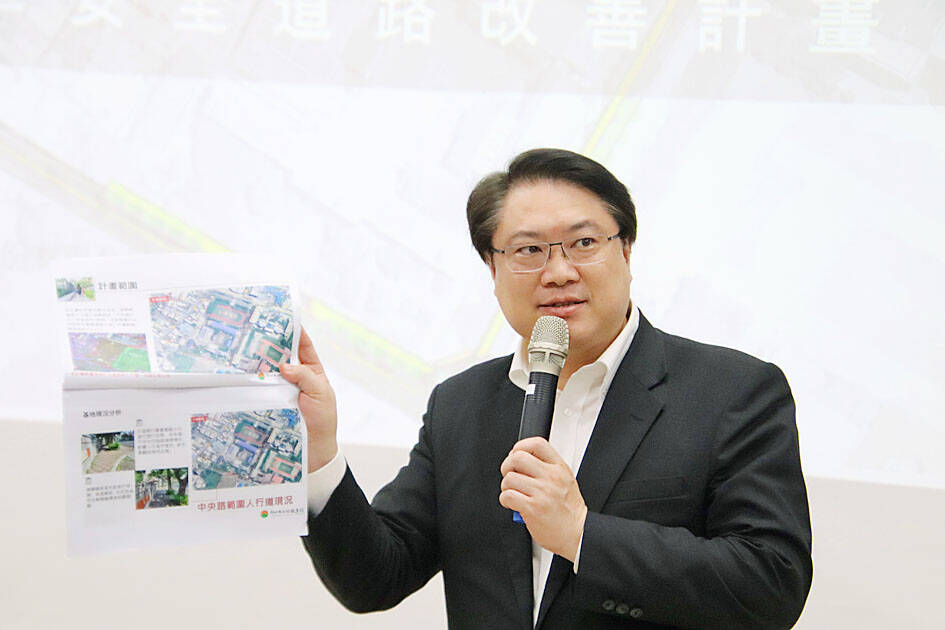The government is considering relaxing immigration rules for migrant workers and foreign students as part of efforts to address a labor shortage and issues linked to the nation’s low birthrate, Minister of the Interior Lin Yu-chang (林右昌) told a trade group yesterday.
Lin made the remarks while giving the keynote speech at a meeting in Taipei of the Third Wednesday Club (三三會), whose membership is limited to the top 100 firms in each business sector.
“We should embrace different views in dealing with foreign workers who currently serve as caregivers for ill senior citizens and work at construction sites,” Lin said.

Photo: Huang Mei-chu, Taipei Times
It is not fair or humane to dismiss caregivers after they have looked after people’s family members for the legal maximum of 12 years and have developed a close relationship with their employers, Lin said.
Perhaps they should be allowed to stay and be naturalized, the minister said.
Similarly, the government is considering whether male migrant workers who work on public and private construction projects should be allowed to stay in Taiwan for good, Lin said, adding that they are currently required to leave after their contracts expire in four to five years.
They usually have received years of training in Taiwan and are therefore welcomed by employers in South Korea and Japan, he said.
“We should revisit our immigration rules, rather than train workers on behalf of other nations,” Lin said.
The change is necessary as Taiwan is to become a super-aged society in 2025, when people aged 65 or older are to account for more than 20 percent of the population, he said.
Taiwan already became an aged society in 2018, with people aged 65 or older making up 14 percent of the population, and the birthrate has declined, Lin said.
The demographic structure is unfavorable for the workforce, causes other social security issues and it would require decades to rectify, the minister said, adding that labor shortages are affecting all levels of the workforce: unskilled, skilled and managerial employees.
Foreign students are another solution, and the government is considering allowing them to extend their stay, giving them two years, instead of 12 months, to find employment in Taiwan upon graduation, the minister said.
Toward that end, policymakers are also debating lowering the wage requirement from NT$42,500 a month, as most graduates in Taiwan have difficulty finding a job that pays that much, Lin said.
The government has offered assorted benefits to boost fertility rates, but to little avail, he added.

Taiwan will prioritize the development of silicon photonics by taking advantage of its strength in the semiconductor industry to build another shield to protect the local economy, National Development Council (NDC) Minister Paul Liu (劉鏡清) said yesterday. Speaking at a meeting of the legislature’s Economics Committee, Liu said Taiwan already has the artificial intelligence (AI) industry as a shield, after the semiconductor industry, to safeguard the country, and is looking at new unique fields to build more economic shields. While Taiwan will further strengthen its existing shields, over the longer term, the country is determined to focus on such potential segments as

UNCERTAINTY: Innolux activated a stringent supply chain management mechanism, as it did during the COVID-19 pandemic, to ensure optimal inventory levels for customers Flat-panel display makers AUO Corp (友達) and Innolux Corp (群創) yesterday said that about 12 to 20 percent of their display business is at risk of potential US tariffs and that they would relocate production or shipment destinations to mitigate the levies’ effects. US tariffs would have a direct impact of US$200 million on AUO’s revenue, company chairman Paul Peng (彭雙浪) told reporters on the sidelines of the Touch Taiwan trade show in Taipei yesterday. That would make up about 12 percent of the company’s overall revenue. To cope with the tariff uncertainty, AUO plans to allocate its production to manufacturing facilities in

COLLABORATION: Given Taiwan’s key position in global supply chains, the US firm is discussing strategies with local partners and clients to deal with global uncertainties Advanced Micro Devices Inc (AMD) yesterday said it is meeting with local ecosystem partners, including Taiwan Semiconductor Manufacturing Co (TSMC, 台積電), to discuss strategies, including long-term manufacturing, to navigate uncertainties such as US tariffs, as Taiwan occupies an important position in global supply chains. AMD chief executive officer Lisa Su (蘇姿丰) told reporters that Taiwan is an important part of the chip designer’s ecosystem and she is discussing with partners and customers in Taiwan to forge strong collaborations on different areas during this critical period. AMD has just become the first artificial-intelligence (AI) server chip customer of TSMC to utilize its advanced

While China’s leaders use their economic and political might to fight US President Donald Trump’s trade war “to the end,” its army of social media soldiers are embarking on a more humorous campaign online. Trump’s tariff blitz has seen Washington and Beijing impose eye-watering duties on imports from the other, fanning a standoff between the economic superpowers that has sparked global recession fears and sent markets into a tailspin. Trump says his policy is a response to years of being “ripped off” by other countries and aims to bring manufacturing to the US, forcing companies to employ US workers. However, China’s online warriors